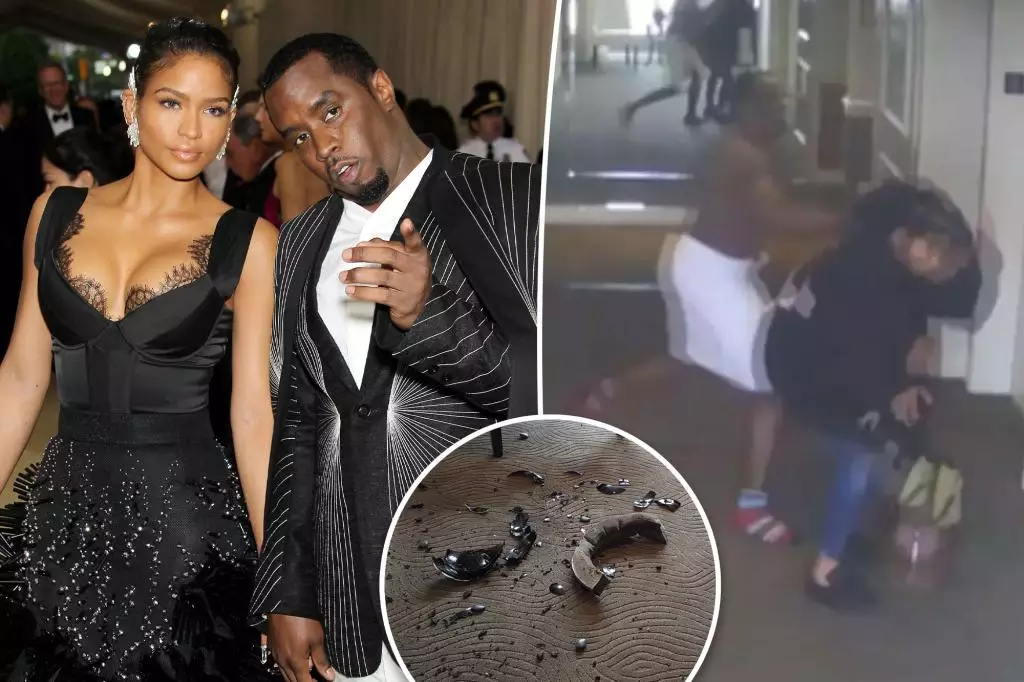Recent courtroom proceedings have unveiled the horrifying consequences of alleged abuse perpetrated by Sean “Diddy” Combs against his former partner, Cassie Ventura. As the shocking details of this trial surface, we are confronted with the chilling reality of power dynamics embedded in celebrity relationships. The evidence presented to the jury, including harrowing photographs of a devastating hotel incident and raw testimonies from Ventura, unveils a cycle of violence cloaked beneath the glitzy exterior of the entertainment industry.
The visuals provided—fragments of a broken vase and the disturbing aftermath of an alleged attack—paint a grim picture. These stark reminders serve as powerful evidence of the physical violence that can occur behind closed doors. Ventura’s testimony, reflecting the trauma she endured, indicates the psychological grip Combs maintained over her life during their turbulent relationship. The disturbing images displayed in court invite society to confront uncomfortable truths about domestic violence and the desperation that often ensnares victims in silence.
Awakening the Victim’s Narrative
Ventura’s resilience in recounting her victimization speaks volumes about the challenges faced by many who find themselves trapped in abusive situations. Often, the stigma surrounding domestic violence leads victims to shy away from seeking help or revealing their abuser. In Ventura’s case, she testified about a pivotal moment when she was driven to call for police assistance but hesitated to disclose the identity of her attacker. This moment underscores a common dilemma in abusive relationships—fear and loyalty towards an abuser can cloud one’s judgment and inhibit one’s voice.
Throwing a vase—a seemingly trivial act in the vast theater of relationships—carries with it the weight of emotional and psychological abuse. Ventura’s recollection of the vase’s trajectory is a metaphorical nod to the way abusers manipulate reality, using intimidation to assert control. It is disheartening to witness how a celebrity’s status can obscure accountability, allowing abusive behaviors to thrive under the radar. Society must rally behind survivors like Ventura, amplifying their voices and facilitating conversations about the deep-rooted issues of control, manipulation, and coercive relationships.
The Surveillance Footage: A Grim Chronicle
The extended surveillance footage, unfiltered and raw, captured moments of unrestrained violence, revealing a deeply troubling narrative of aggression. Witnessing Combs chase Ventura down the hotel hallway, only to physically assault her, forces viewers to reconsider their perceptions of fame and adoration. Such incidents highlight an unsettling duality within high-profile relationships: the public persona often masks private horror, leaving victims to battle their trauma in solitude.
Moreover, the testimony of hotel security guard Israel Florez adds another layer to the labyrinth of alleged misconduct. If Combs attempted to silence him with a monetary offer, it illustrates the lengths an abuser might go to preserve their facade. The culture surrounding celebrity and power often shields perpetrators from accountability, reinforcing the idea that wealth can buy silence and manipulate truth.
Deconstructing the Culture of Silence
As more victims come forward, the bombshell accusations laid against Combs may provoke a necessary reckoning within the entertainment industry. The narratives of those who suffer abuse should never be relegated to sensational headlines but must instead drive societal change. Ventura’s lawsuit against Combs sprung from the courage to expose the truth—a crucial step in deconstructing the silence that often envelops abusive circumstances. The public must engage actively in discussions surrounding power dynamics, consent, and respect—issues that remain alarmingly pertinent.
In 2024, when authorities raided Combs’ properties and discovered alarming quantities of narcotics and weapons, it became painfully clear that the roots of this case extend far beyond personal relationships. The intersection of fame, power, and alleged criminal behaviors calls for critical scrutiny. As Combs faces a slew of legal troubles, including serious charges such as sex trafficking, it is imperative that society not only provides support for victims but challenges the culture that enables such toxic behaviors to flourish.
This pivotal moment in the courtroom highlights a transformation, wherein victims are reclaiming their narratives and dismantling the barriers that once kept them voiceless. It serves as a potent reminder that the fight against domestic violence and sexual abuse must continue vigorously, championing the rights of survivors and galvanizing societal change.

Leave a Reply